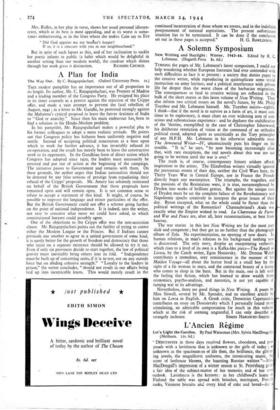A Solemn Symposium
New Writing and Daylight : Winter, 1943-44. Edited by R. C. Lehmann. (Hogarth Press. 8s. 6d.)
TURNING the pages of Mr. Lehmann's latest symposium, I could not help wondering whether European literature had ever contended with such difficulties as face it at present: a society that denies paper to the creative writer, while reproducing in quintuplicate some trivial instruction on army latrines; and a political interference with ptivate life far deeper than the worst chaos of the barbarian migrations. The consequences so fatal to creative writing are reflected in the bulk of the short stories in this latest volume of New Writing. They also inform two critical essays on the novel's future, by Mr. Philip Toynbee and Mr. Lehmann himself. Mr. Toynbee insists—rightly, I- think—that if the novel is to survive as a form of art, it must con- tinue to be exploratory, it must chart an ever widening area of con- scious and subconscious experience: and he deplores the stultification of the 'thirties, exemplified in the case of Christopher Isherwood, his deliberate restriction of vision at the command of an orthodox political creed, adopted quite as uncritically as the Tory principles of any M.F.H. Mr. Lehmann in his otherwise admirable essay The Armoured Writer—/V, unconsciously puts his finger on the trouble. " It is," he says, " by now becoming increasingly clear that, with rare exceptions, the real novels about this war are not going to be written until the war is over."
The truth is, of course, contemporary history seldom affords inspiration to the artists. The Elizabethan writers virtually ignored the portentous events of their day, neither the Civil- Wars here, the Thirty Years War in Central Europe, nor in France the Fronde directly begot any masterpiece. The triumphs, the tragedies, and the passions of the Restoration were, it is true, metamorphosed by Dryden into works of brilliant genius. But against the unique case of Dryden must be set the complete failure of the Revolutionary and Napoleonic epochs creatively to interpret the great issues of their day. Byron excepted, what on the whole could be flatter than the political writings of the Romantics? Chateaubriand's Atala was exactly what the Empire wished to read. La Chartreuse de Parme and War and Peace are, after all, later reconstructions, at best from hearsay.
The war stories in this last New Writing are for the most part slick and competent ; but they get us no further than the photograph -album of Zola. No experimentation, no opening of new doors. In human relations, in man's relation to his background nothing new is discovered. The only story, despite an exasperating verbosity, which rises to a level of its own is a Kafka-like piece—The Rervolt in Liossa, by the Czech writer, Egon Hostovsky. Mr. Denton Welch contributes a tremulous, sexy reminiscence in the manner. of his Maiden Voyage—all about the horror bred in a small boy by the sight of a fat woman in stays, and the contrasted beauty of a tramp
who comes to sleep in the barn. But in the main, one is left with the feeling that fiction, which has learned to draw wealth from economics, psycho-analysis, and narcotics, is not yet capable of turning war to its advantage.
Nevertheless, there are good things in New Writing. A poem by Miss Sitwell, several by Mr. Spender, and an excellent article by him on Lorca in English. A Greek critic, Demetrios Capetanakis, contributes an essay on Dostoievsky which I personally found most stimulating, an admirable compensation for much in this volume which at the risk of seeming ungrateful. I can only describe as


























 Previous page
Previous page